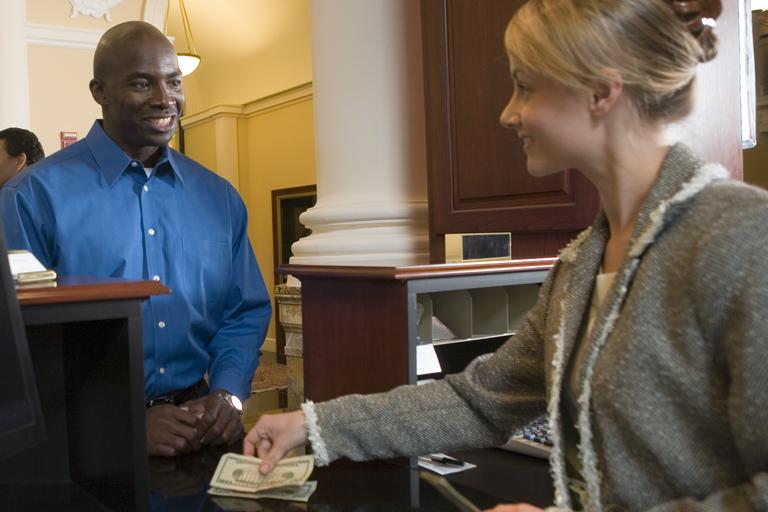Our customers have been hired at: *Foot Note
Securing a cashier interview means your resume and cover letter stood out in the customer service industry. Now, impress the hiring manager with your skills. Face-to-face interviews are crucial in the hiring process, offering the first opportunity for mutual interaction. Prepare with cashier interview questions to make a strong impression.
Customer-facing positions like cashiers are crucial to any retail store. When interviewing for an open cashier position, employers want to know if candidates have the proper skill set to complete transactions effectively, interact with customers and accurately represent the company.
In this guide, we’ll review cashier interview questions with answers to help you prepare for your next interview and ace it.
Common Cashier Interview Questions and Answers
Common cashier interview questions will include various topics, from work ethic to previous employment experience. Here are three common cashier interview questions and how to answer them:
In your opinion, how can a cashier provide quality customer service?
Cashiers are usually the only people customers interact with during their purchase journey. Because of this, hiring managers need to assess the candidate’s approach to customer service and gauge whether it fits in with the company’s culture.
To answer, learn about the company’s personality and see how your perspective aligns. Be honest while incorporating critical customer service skills that show the employer you can deliver quality service. Here’s an example:
What were some of your main duties in your previous positions?
This question is straightforward. The interviewer wants to know what you did on a typical day at your previous job to see if you have the proper experience for the current open position.
Answer the question directly. Say so if you took on extra tasks to go above and beyond your job duties. That will show the interviewer your can-do attitude. Here’s an example:
Why are you leaving your current position?
The key to this question is to keep it positive. Even if you left your previous position unsatisfied with the job or the company environment, focus on what you want to do next. For example:
Need help with your cashier resume? Our Resume Builder suggests industry-specific skills to ensure your resume gets noticed by recruiters.
Technical Cashier Interview Questions and Answers
Interviewers ask technical questions to assess whether you have the necessary technical skills and knowledge to fulfill your job duties correctly. Here are some questions you can expect in your job interview:
How do you handle a situation where a customer’s payment method is declined?
This question tests your problem-solving skills and capacity to manage sensitive situations without compromising customer service. Here’s a sample answer:
Can you explain the process of balancing a cash register at the end of your shift?
This is an excellent opportunity to mention the hard skills you use daily. The interviewer evaluates your knowledge of accurately handling money, counting cash, and ensuring correct register balances. Here’s an example:
How would you handle a discrepancy if your cash register was short or over at the end of your shift?
The hiring manager aims to assess your attention to detail, honesty, and approach to resolving discrepancies in financial transactions, which is a crucial cashier’s duty.
Be concise and highlight your commitment to transparency. See this sample answer:
Behavioral Cashier Interview Questions and Answers
Behavioral interview questions for cashiers aim to evaluate your ability to handle real-life work situations. Hiring managers ask these questions to see how you apply your skills to solve problems efficiently and whether you will fit in with the team dynamic. Here are a few you can expect:
Can you tell me about a time when you dealt with a difficult customer?
There will always be challenging situations with customers, and the employer needs to know that you can handle them efficiently without compromising the company’s image.
When answering these types of cashier job interview questions, use the STAR method to respond. Here’s how:
Describe a time when you had to work under pressure. How did you manage your tasks?
The interviewer is trying to evaluate your time management skills. Think of a situation such as a busy shift. How did you handle it? See this example:
Give an example of when you went above and beyond for a customer.
Remember, cashiers are the face of the company. Employers want to know that you can put the customer first and offer a quality service experience.
This is an opportunity to show the interviewer your commitment to the job and your interpersonal skills. For example:
Browse our retail resume examples to see how other candidates showcase their qualifications and expertise.
Situational Cashier Interview Questions and Answers
While similar to behavioral interview questions, hiring managers may use situational interview questions to pose hypothetical situations and see how they would address the problem. Check out these examples:
If you notice a coworker struggling to handle a transaction or interacting with a difficult customer, what would you do?
Teamwork is always an essential part of any thriving business. This question examines whether you will be willing to support your colleagues.
If you’ve been in a similar situation, use the PAR method to explain how you managed the problem to the interviewer. Here’s an example:
What would you do if a customer insisted on a refund for an item past the return policy deadline?
This is where your research comes in handy. The hiring manager evaluates whether you know the company’s policies and can balance policy enforcement with customer service.
Show off your research while maintaining your stance on a customer-first approach. See this sample answer:
“If a customer insisted on a refund for an item past the return policy deadline, I would first empathize with their situation and acknowledge their frustration. However, I would gently explain the store’s return policy, emphasizing the importance of these guidelines for maintaining fair practices for all customers.
I would explore possible solutions to uphold a customer-first approach, such as offering an exchange or store credit if applicable. If the customer is still unhappy, I would escalate the situation to a manager, as they might have more flexibility to address exceptional cases. I aim to ensure the customer feels heard and valued while adhering to company policies, aiming for a resolution that satisfies both the customer and the store’s standards.”
If a payment system goes down and you can’t process transactions, how would you handle customers waiting in line?
The interviewer assesses your decision-making and critical thinking skills while staying calm under pressure and ensuring customer satisfaction. You can say, for example:
Tips for Answering Cashier Job Interview Questions
- Research the company: Learn everything you can about the job, the team and the business. This will help you create thoughtful answers and show the interviewer your enthusiasm for the position.
- Conduct mock interviews: Ask a friend to pose as the interviewer to allow you to practice your answers, posture and body language.
- Focus on relevant skills and experience: Your responses should highlight how your work history has prepared you for the role by mentioning past accomplishments and skills acquired.
- Be ready to improvise: The interviewer will likely ask a question you must still prepare for. Take a second to think about it. Your research and prep work will help you think of a quick response.
- Be brief: Hiring managers are busy people. While practicing your answers, always look for ways to shorten them.
Key Takeaways
- Cashiers are the face of the company, so always highlight your commitment to excellent customer service while enforcing the company’s policies.
- When answering technical questions, demonstrate to the interviewer how you apply your skills on the job.
- Behavioral interview questions ask about real-life work situations, so use the opportunity to speak on your past work achievements.
- When applicable, structure your answers using the STAR or PAR method to ensure you’re offering an efficient response.
FAQ
What are the strengths of a cashier?
Here are some strengths you can highlight while answering job interview questions for cashier:
- Attention to detail
- Numerical proficiency
- Multitasking ability
- Adaptability
- Communication skills
How do I know whether to use the STAR or PAR method?
Both the STAR and PAR methods are excellent resources for answering questions related to work situations, whether real or hypothetical. The difference is that the STAR method has one more step, so think about the problem and the most efficient way to communicate the relevant information.
Should I bring my resume to the interview?
Yes. Even if the hiring manager already has your resume, bring two hard copies: one for the interviewer in case they still need to print it out and one for you to reference in case you have trouble answering a question.
See our resume writing guide to craft an impressive cashier resume.
How We Reviewed This Article
Since 2012, we have helped more than 11 million job seekers. We want to make your career journey accessible and manageable through our services and Career Center’s how-to guides and tips. In our commitment to bring you a transparent process, we present our Editorial Process.
Our customers have been hired at:*Foot Note












